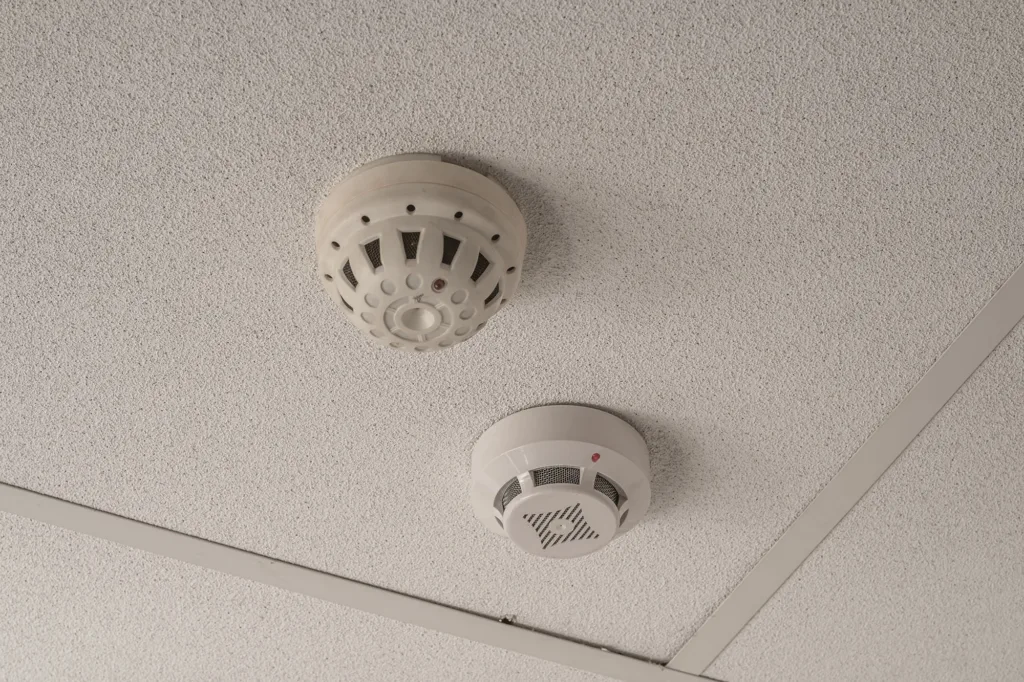House fires remain a serious risk in the UK, with over 34,000 incidents recorded annually—that’s one fire every 15 minutes. Tragically, more than 200 people lose their lives each year, and the majority of these fires (63%) are caused by preventable accidents. The biggest culprit? Cooking appliances, responsible for 44% of all house fires.
Fires can spread alarmingly fast, turning a small spark into a life-threatening blaze within minutes. The best way to protect your home and loved ones is through a reliable fire detection system. But with different types available, how do you choose the right one? Should you install heat detectors, smoke alarms, or multi-sensor devices?
In this guide, we’ll explore the three main fire detection systems used in UK homes, their benefits, and how to ensure they meet fire safety regulations.
1. Heat Detectors
How Heat Detectors Work
Heat detectors activate when they sense a rise in temperature beyond a set threshold. Unlike smoke alarms, they do not respond to particles in the air but instead react to the actual heat from a fire. There are two primary types:
- Fixed Temperature Detectors – These trigger an alarm when the temperature reaches a specific limit, usually around 54°C – 65°C.
- Rate-of-Rise Detectors – These detect a rapid temperature increase over a short period, even if the absolute temperature remains low.
Best Applications for Heat Detectors
Heat detectors are best used in locations where smoke or steam might cause false alarms. Common areas include:
- Kitchens – Where cooking fumes can trigger false alarms in smoke detectors.
- Garages – Where dust, exhaust fumes, or chemical vapours may interfere with smoke detection.
- Boiler Rooms – Where high ambient temperatures make smoke detection less reliable.
Pros and Cons of Heat Detectors
✅ Fewer false alarms – Ideal for kitchens and garages.
✅ Reliable in high-dust or steam-prone areas – Where smoke detectors would struggle.
❌ Slower response time – Less effective for fast-spreading fires compared to smoke detectors.
❌ Limited use in living spaces – Not ideal for bedrooms or hallways where early smoke detection is crucial.
2. Smoke Detectors
Smoke detectors are the most common type of fire detection system used in UK homes. They detect smoke particles in the air and trigger an alarm before a fire spreads. There are several types of smoke detectors, each suited for different fire risks.
Types of Smoke Detectors
Ionisation Smoke Detectors
- Best for detecting fast-flaming fires (e.g., paper, wood, or petrol fires).
- Respond quickly but can be triggered by burnt toast or steam.
- Less effective at detecting slow-smouldering fires.
Optical (Photoelectric) Smoke Detectors
- Detect slow-smouldering fires (e.g., foam-filled furniture or electrical fires).
- Work well in bedrooms and hallways but may react slower to flaming fires.
Aspirating Smoke Detectors (ASD)
- Continuously sample air for smoke particles.
- Used in high-risk environments like historic buildings or large properties.
- More expensive but provide ultra-early detection.
Where to Install Smoke Detectors
- Bedrooms & Living Rooms – Optical detectors are ideal here.
- Hallways & Landings – At least one smoke alarm should be installed per floor.
- Not in Kitchens & Garages – Use heat detectors instead to avoid false alarms.
Limitations of Smoke Detectors
While highly effective, smoke detectors have drawbacks:
- False alarms from cooking or steam.
- Not suitable for all environments, such as garages or dusty areas.
For enhanced safety, many homeowners now opt for multi-sensor detectors, which combine heat and smoke detection in one device.

3. Multi-Sensor Detectors
How Multi-Sensor Detectors Work
Multi-sensor detectors use a combination of heat and smoke detection technologies to provide the best protection. By analysing multiple data points, they reduce false alarms while improving fire detection speed.
Why Multi-Sensor Detectors Are the Best Option
✔ More reliable – Can detect both fast-flaming and slow-smouldering fires.
✔ Fewer false alarms – Reduces unwanted triggers from cooking or steam.
✔ Ideal for all areas – Suitable for bedrooms, hallways, and even some kitchens.
These advanced detectors are often used in professional fire alarm installations. For an example of how these systems are effectively installed in homes, check out Wave Electrical Solutions’ fire safety project.
UK Fire Safety Regulations for Homeowners
Fire detection systems must comply with UK safety standards. According to BS 5839-6:2022, all domestic properties must have a fire detection system suited to their layout and risk level. Key requirements include:
- At least one smoke alarm per floor.
- Heat alarms in kitchens to reduce false alarms.
- Interlinked alarms in rental properties to ensure all alarms sound simultaneously.
For homeowners or landlords looking for professionally installed systems, Wave Electrical Solutions’ commercial fire detection services can help ensure compliance.
Choosing the Right Fire Detection System for Your Home
Selecting the right fire detection system depends on:
- Home layout – Larger homes may require interconnected alarms.
- Risk factors – Homes with open-plan kitchens need different solutions.
- Budget – Multi-sensor detectors offer superior protection but cost more.
If you’re unsure which system suits your home best, speak to an expert to get tailored advice on installation.
FAQs
1. How often should fire detection systems be tested?
Fire alarms should be tested weekly, with a full system service at least once a year. Batteries should be replaced annually unless using sealed units.
2. Can I install fire detectors myself, or do I need an electrician?
Battery-powered alarms can be self-installed, but mains-powered or interlinked systems should be fitted by a qualified electrician.
3. What is the best fire detection system for rental properties?
Landlords must install interlinked smoke and heat alarms, complying with the BS 5839-6:2022 standard. Multi-sensor detectors are highly recommended.
Closing Thoughts
Fire detection is not something to take lightly. A properly installed and maintained system can save lives and prevent serious damage. Whether you choose heat, smoke, or multi-sensor detectors, ensuring they meet UK fire safety standards is crucial.
For professional installation and expert advice, explore Wave Electrical Solutions and find the best fire detection solutions for your home.










